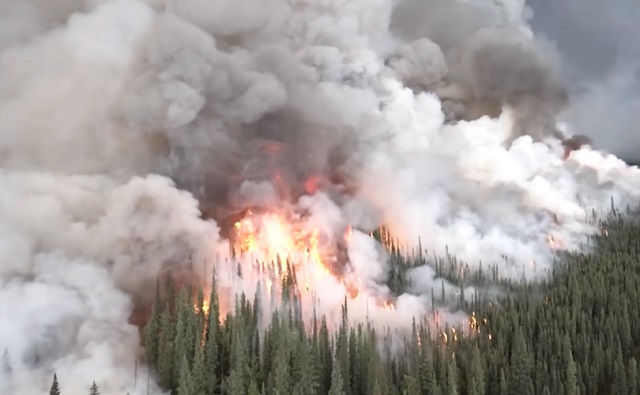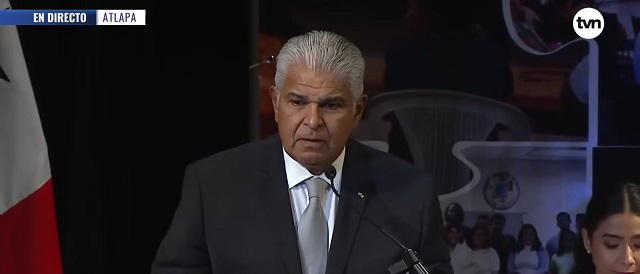Opinion
Could the Oilers use MacT-vision Monday night?

National
Trudeau again blames ‘climate change’ for mostly man-made wildfires

From LifeSiteNews
Trudeau and the media which his government funds appear intent on blaming Canada’s wildfires on ‘climate change’ in what seems to be an attempt to justify radical public policy.
Prime Minister Justin Trudeau and his Liberals are once again blaming Canadian wildfires on “climate change” despite most being man-made.
In a May 10 press release, Prime Minister Justin Trudeau and Deputy Prime Minister Chrystia Freeland lectured Canadians on the so-called dangers of “climate change” amid Canada’s wildfire season, apparently ignoring that data has revealed that most wildfires are man-made.
“Climate change is here, and we’re making sure our communities are ready,” Trudeau stated.
“Last year was the worst wildfire season in Canadian history, and climate change is only causing more frequent and more extreme wildfires,” Freeland claimed.
In addition to the Liberal government, mainstream media outlets have also started publishing articles attributing Canada’s wildfires to “climate change.”
“The seeds of fire activity were sown over the winter and in past years as the world continues to warm because of human-driven climate change,” CNN claimed in a May 15 article.
Despite the claims of the Trudeau government, the Alberta Wildfire Status Dashboard, which tracks wildfires in the province, found that 232 (72.96%) of the wildfires started this year have been linked to human activity. On the other hand, only 1 (0.31%) was caused by lightning, while 85 (26.73%) remain under investigation.
Last month, Alberta Minister of Forestry and Parks Todd Loewen revealed that his department estimates that most of the province’s wildfires this year are man-made.
Additionally, an April study revealed that while global temperatures have “moderately” increased since 1950, the claim that extreme weather events are significantly increasing is unsupported by scientific evidence.
Telling Canadians the same lies as in 2023
Indeed, Trudeau and the media his government funds appear intent on blaming Canada’s wildfires on “climate change” regardless of the facts, similar to their tactics in spring 2023 when Canada faced one of its worst fire seasons.
“Rise in extreme wildfires linked directly to emissions from oil companies in new study,” Canadian Broadcasting Corporation (CBC), which gets 70 percent of its operating budget via tax dollars from the federal government, claimed at the time.
However, similar to now, Trudeau’s claims were unfounded and contradicted both research and wildfire data.
Indeed, despite claims that wildfires have drastically increased due to “climate change,” 2023 research revealed that wildfires have decreased globally while media coverage has spiked 400 percent.
Furthermore, many of the fires last spring and summer were discovered to be caused by arsonists and not “climate change.”
Last year, the Royal Canadian Mounted Police (RCMP) arrested and charged suspected arsonists for allegedly lighting fires across the country, including in the Yukon, British Columbia, and Alberta.
In Quebec, satellite footage also showed the mysterious simultaneous eruption of several blazes across the province, sparking concerns that the fires were a coordinated effort by arsonists.
Why push the ‘climate change’ narrative?
Trudeau’s determination to push the claim that the fires are unprecedentedly dangerous and caused by “climate change” appears by critics to be nothing but an attempt to pass further regulations on natural resources.
The Trudeau government has continued to insist on so-called net zero carbon policies, seeking a complete elimination of the fossil fuel industry in the future.
The reduction and eventual elimination of the use of so-called “fossil fuels” and a transition to unreliable “green” energy has also been pushed by the World Economic Forum (WEF) – the globalist group behind the socialist “Great Reset” agenda – an organization with which Trudeau and some in his cabinet are involved.
While Trudeau’s plan has been pushed under the guise of “sustainability,” his intention to decrease nitrous oxide emissions by limiting the use of fertilizer has been criticized by farmers. They say this will reduce profits and could even lead to food shortages.
Automotive
Governments in Canada accelerate EV ‘investments’ as automakers reverse course

From the Fraser Institute
Evidence continues to accrue that many of these “investments,” which are ultimately of course taxpayer funded, are risky ventures indeed.
Even as the much-vaunted electric vehicle (EV) transition slams into stiff headwinds, the Trudeau government and Ontario’s Ford government will pour another $5 billion in subsidies into Honda, which plans to build an EV battery plant and manufacture EVs in Ontario.
This comes on top of a long list of other such “investments” including $15 billion for Stellantis and LG Energy Solution, $13 billion for Volkswagen (with a real cost to Ottawa of $16.3 billion, per the Parliamentary Budget Officer), a combined $4.24 billion (federal/Quebec split) to Northvolt, a Swedish battery maker, and a combined $644 million (federal/Quebec split) to Ford Motor Company to build a cathode manufacturing plant in Quebec.
All this government subsidizing is of course meant to help remake the automobile, with the Trudeau government mandating that 100 per cent of new passenger vehicles and light trucks sold in Canada be zero-emission by 2035. But evidence continues to accrue that many of these “investments,” which are ultimately of course taxpayer funded, are risky ventures indeed.
As the Wall Street Journal notes, Tesla, the biggest EV maker in the United States, has seen its share prices plummet (down 41 per cent this year) as the company struggles to sell its vehicles at the pace of previous years when first-adopters jumped into the EV market. Some would-be EV makers or users are postponing their own EV investments. Ford has killed it’s electric F-150 pickup truck, Hertz is dumping one-third of its fleet of EV rental vehicles, and Swedish EV company Polestar dropped 15 per cent of its global work force while Tesla is cutting 10 per cent of its global staff.
And in the U.S., a much larger potential market for EVs, a recent Gallup poll shows a market turning frosty. The percentage of Americans polled by Gallup who said they’re seriously considering buying an EV has been declining from 12 per cent in 2023 to 9 per cent in 2024. Even more troubling for would-be EV sellers is that only 35 per cent of poll respondents in 2024 said they “might consider” buying an EV in the future. That number is down from 43 per cent in 2023.
Overall, according to Gallup, “less than half of adults, 44 per cent, now say they are either seriously considering or might consider buying an EV in the future, down from 55 per cent in 2023, while the proportion not intending to buy one has increased from 41 per cent to 48 per cent.” In other words, in a future where government wants sellers to only sell EVs, almost half the U.S. public doesn’t want to buy one.
And yet, Canada’s governments are hitting the gas pedal on EVs, putting the hard-earned capital of Canadian taxpayers at significant risk. A smart government would have its finger in the wind and would slow down when faced with road bumps. It might even reset its GPS and change the course of its 2035 EV mandate for vehicles few motorists want to buy.
Author:
-

 National2 days ago
National2 days agoDespite claims of 215 ‘unmarked graves,’ no bodies have been found at Canadian residential school
-

 Brownstone Institute1 day ago
Brownstone Institute1 day agoThe WHO’s Proposed Pandemic Agreements Worsen Public Health
-

 armed forces1 day ago
armed forces1 day agoTrudeau government has spent $10 million promoting DEI in the military as recruitment flounders
-

 Health1 day ago
Health1 day agoTHE WPATH TAPES: Behind-The-Scenes Recordings Reveal What Top Gender Doctors Really Think About Sex Change Procedures
-

 COVID-191 day ago
COVID-191 day agoTrudeau’s public health agency recommends another experimental COVID booster
-

 John Stossel1 day ago
John Stossel1 day agoProtecting Free Speech: The Early Warning Signs From Around The World
-

 illegal immigration2 days ago
illegal immigration2 days agoPanama’s Incoming President Wants To Shut Down His Country’s Most Treacherous Route For Migrants — But Will It Work?
-

 Addictions1 day ago
Addictions1 day agoPoilievre attacks decriminalization of hard drugs with Safe Hospitals Act






